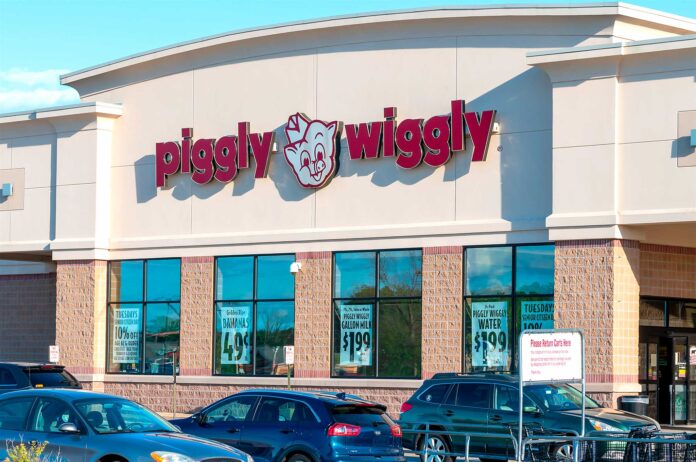Kroger and Albertsons/Safeway announce comprehensive Divestiture Plan with C&S Wholesale Grocers in Connection with Proposed Merger
If the proposed $24.6 Billion merger of Kroger/Fred Meyer with Albertsons/Safeway is completed, the iconic Piggly Wiggly grocery chain may be coming to the Pacific Northwest.
Kroger, the largest supermarket chain in America, wants to acquire Albertsons, the second largest, through a negotiated merger. The net result would be a mammoth grocery chain with nearly 5,000 stores and 710,000 employees, in addition to 66 distribution centers, 52 manufacturing plants, nearly 4,000 pharmacies and 2,015 fuel centers, according to a Kroger press release. If completed, the super chain would control almost a quarter of the entire US food market.
But there is a catch posing a big hurdle for Kroger’s plans: The merger faces tough opposition built around claims it creates a monopoly. The Federal Trade Commission (FTC) is reviewing the merger for potential antitrust violations, and many state agencies and other organizations are against it. Seven Democratic Secretaries of State have signed a letter to the FTC stating opposition to the merger, citing a lack of choice for consumers and potential higher prices due to reduced competition. No West Coast states are involved in the complaint.
A coalition of more than 100 union groups calling themselves “Stop the Merger” also oppose the plan. The reasons given are the creation of food and pharmacy “deserts,” higher consumer prices, lower wages, and lack of competition. Their objection sent to the FTC has been cosigned by more than 250 organizations, including consumer advocacy groups, community groups, church councils and local municipalities, according to the nonprofit Private Equity Stakeholder Project, which actively promotes consumer issues affected by “private equity,” typically investment funds.
And this is where Piggly Wiggly enters the picture. To win approval from the FTC, Kroger/Albertsons must counter these claims and overcome potential antitrust violations. As a result, the companies have proposed a reduction in number of stores owned.
On Friday, September 8, the Kroger Company announced it had finalized the $2 billion sale of 413 stores to C&S Wholesale Grocers, LLC, a privately owned company in New Hampshire. The sale includes eight distribution centers, two offices and five private-label brands. Although C&S is primarily a grocery wholesaler, they own Grand Union supermarkets with 11 stores in upstate New York and Vermont.
They also own the Piggly Wiggly supermarket chain, with a total of 504 stores. Piggly Wiggly is a franchise, meaning each store is locally owned and operated. C&S owns the franchise and provides stores with merchandise. In total, C&S supplies more than 7,700 independent supermarkets, chain stores, military bases and institutions with more than 140,000 different products.
According to Kroger, 49 Albertsons and Kroger stores would be transferred in Oregon, along with 104 in Washington. In Oregon, Kroger operates under the Fred Meyer and QFC brands.
“This comprehensive divestiture plan marks a key next step toward the completion of the merger by extending a well-capitalized competitor into new geographies,” stated Kroger. “The divestiture plan ensures no stores will close as a result of the merger and that all frontline associates will remain employed, all existing collective bargaining agreements will continue, and associates will continue to receive industry-leading health care and pension benefits alongside bargained-for wages.”
However, past history may challenge Kroger/Albertsons’ claims. In 2014, Northwest grocery chain Haggen Food and Pharmacy purchased 146 West Coast Safeway and Albertsons stores as part of another anti-monopoly deal when Albertsons and Safeway merged. Haggen subsequently sued Albertsons for $1 billion, claiming the company used unfair sales practices to undercut Haggen in addition to providing inaccurate or misleading data on the stores Haggen purchased. They declared bankruptcy and closed 27 stores, including one in Tualatin, in August 2015, less than a year after it opened. That location remains unoccupied to this day.
Haggen settled its billion-dollar lawsuit in 2016 for $5.75 million, and only a few months later, Albertsons bought Haggen. The implications for the current proposed sale of stores to C&S are not lost on regulators and opponents of the merger.
Even if Kroger eventually wins FTC approval, this is not expected to happen any earlier than 2024, and perhaps later. At this time, the sale of the 413 stores to C&S would take place. These stores are expected to be in areas where Kroger/Albertsons operate, including the Pacific Northwest.
While there is no certainty that C&S would operate its new stores as franchised Piggly Wigglys, it is possible. Piggly Wiggly has the distinction of being the first ever true grocery store in America, opened in 1916 by Clarence Saunders in Memphis, Tennessee. Before this time, grocery goods were kept behind the counter, and customers ordered items that were brought to them at the counter. Saunders’ idea was to place food on shelves in aisles and allow customers to use shopping carts and select their own individually priced items, taking them to checkout stands when finished.
Critics mocked Saunder’s radical new ideas and predicted Piggly Wiggly would fail. But the rest, as they say, is history.






















